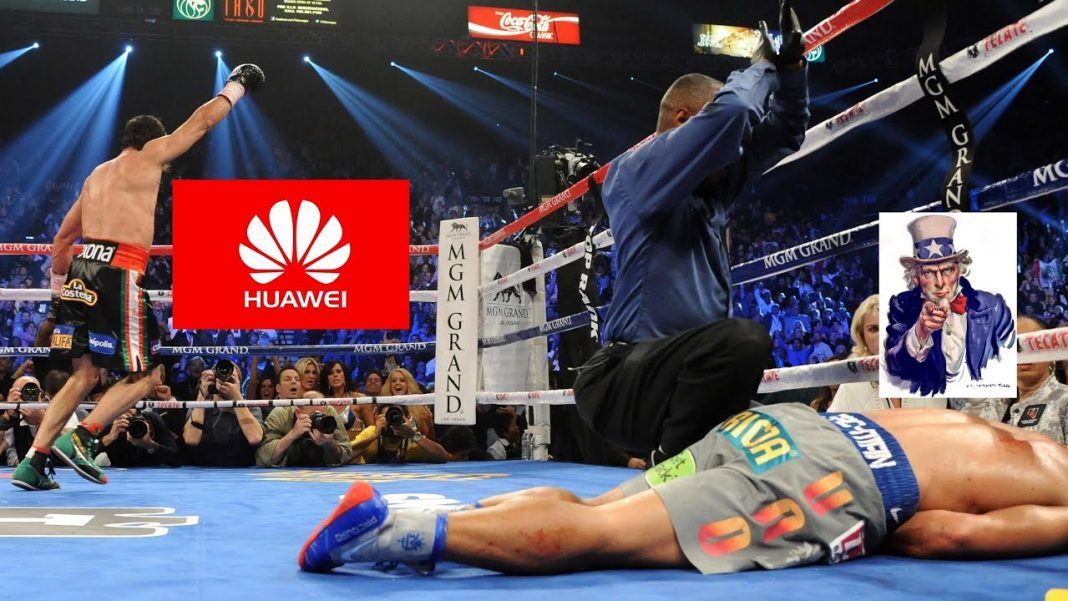
In a fight that overshadowed the world’s biggest mobile technology trade fair in Barcelona, Spain, the U.S. government’s intense fight to ban Chinese tech giant Huawei from next-generation internet networks appears to be flagging. The introduction of their Mate X hybrid folding phone-tablet may increase demand from tech consumers in America where it appears to be superior to Samsung‘s Galaxy Fold.
The two sides faced off Tuesday at the world’s biggest mobile technology trade fair, in Barcelona, Spain, where they sought to win over customers and governments.
The U.S. argues Huawei is a security risk as it could give the Chinese government backdoor access to snoop on internet users worldwide. Huawei rejects the claim, which it says is part of the United States’ broader effort to stifle China’s economic and technological ascent.
On Tuesday, a top Huawei executive used a keynote speech at the show, called MWC Barcelona, to poke fun at U.S. intelligence.
“PRISM, PRISM, on the wall, who is the most trustworthy of them all?” said Guo Ping, Huawei’s rotating chairman, in a reference to a U.S. data gathering program.
“If you don’t understand that, you can go ask Edward Snowden,” he told the audience, referring to the former National Security Agency contractor who exposed the program in 2013.
Under the PRISM program, the NSA, pursuant to secret court orders, collected intelligence about foreign threats through U.S. Internet companies.
In raising the U.S. government’s history of snooping on citizens, Guo appeared to seek to portray the United States as hypocritical in accusing the Chinese of being a risk for users’ data privacy.
Huawei is the world’s biggest maker of networking equipment used by phone and internet companies, and its gear is considered by experts as affordable and high quality.
Banning the company from supplying the networks — work that is ongoing in many countries this year — could delay the rollout of 5G networks, which are meant to power the next generation of technological innovation, from self-driving cars to remote surgery.
Huawei made its presence felt at the four-day conference in Barcelona, where some 100,000 visitors are expected and the company’s red logo featured widely. It unveiled an expensive, new foldable phone that made headlines and turned attention to a product that’s not facing any global controversy.
The United States government also dispatched a delegation to lobby its case, which it has pressed with allies across the world in recent weeks.
“The global nature of data flows and interconnectedness means that threats to U.S. networks have a direct bearing on the security of our allies, just as threats to our allies networks have a direct bearing on the security of the United States,” said Robert Strayer, the top U.S. diplomat for cybersecurity policy.
“To this end the United States is asking other governments and the private sector to consider the threat posed by Huawei and other Chinese information technology companies.”
Strayer did not detail specific security threats Huawei poses, despite being asked by reporters to do so in a news briefing on the show’s sidelines.
The U.S. campaign took a symbolic hit after the United Arab Emirates, a key ally in the Middle East, said it would use Huawei in its networks. And European allies are balking at banning the company outright.
Strayer denied Washington was retaliating as part of a broader trade war between the U.S. and China, saying the motivation was based on security concerns partly related to Chinese laws requiring companies to comply with intelligence requests.
Strayer called Huawei “duplicitous and deceitful,” pointing out that U.S prosecutors have charged the company with intellectual property theft and allege its chief financial officer, Meng Wanzhou, committed fraud by misleading banks about Huawei’s business dealings in Iran.
However, it’s far from clear that telecom executives in Europe and other regions are buying Washington’s argument, with leaders of some of the biggest mobile operators calling for fact-based security assessments.
The U.S. is “fighting an uphill battle” against the telecom industry, said Paul Triolo, head of geotechnology at the Eurasia Group consultancy. “They don’t have a smoking gun here,” so they’re trying to build a stronger case around the company’s behavior and issues with the Chinese government, he said.
Guo, one of three Huawei executives who take turns as chairman, said the telecom industry needs unified standards and clear regulations. He rejected the U.S. allegations.
“We don’t do bad things. Here, let me say this as clear as possible. Huawei has not and we will never plant ‘backdoors’ and we will never allow anyone to do so in our equipment.”
Underscoring the company’s growing momentum in fighting the U.S. allegations, the telecom provider Etisalat of the United Arab Emirates, a strong U.S. ally in the Mideast, said it signed a deal with Huawei to deploy its 5G technology. Majority government-owned Etisalat is one of two main mobile providers in the UAE.
Etisalat offered no financial terms for the deal it signed with Huawei.
The UAE has increasingly courted Chinese investment in the country as its real-estate market sags through a downturn. Chinese construction firms meanwhile rapidly build highway overpasses and infrastructure at the site of the 2020 World Expo, or world’s fair, in Dubai. Chinese President Xi Jingping visited the Emirates last June.
The U.S. Embassy in Abu Dhabi did not immediately respond to a request for comment on the Huawei deal. The UAE hosts some 5,000 American troops, many at the Al Dhafra Air Base in Abu Dhabi. Dubai also is the busiest port of call for the U.S. Navy outside of the United States.

